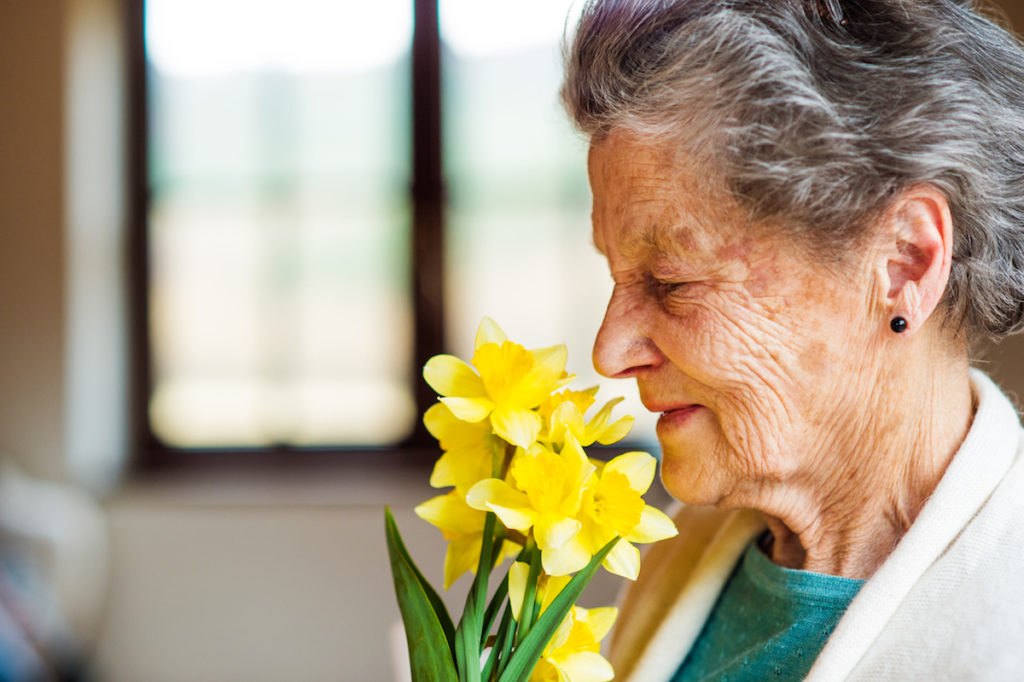
When you walk through the doors of even the cleanest and best-maintained senior living community or nursing home, you may detect a slightly musty or grassy odor. Depending on whom you’re talking to, this might be deemed “old people smell” and associated with uncleanliness. But, is there really a common odor to senior living communities, and if so, what causes it?
The “old people smell” is not only known in our country but around the world. In fact, the Japanese have created a word to describe the unique scent, “kareishu.” Not only have they created a word to describe it, but companies have created products tailored towards hampering or covering the scent up entirely. The Shiseido Group, a Japanese cosmetics company, has created a perfume that specifically targets and neutralizes the smell given off by nonenal (component for a body odor in older people).
While the scent may be deemed unpleasant by some, it is naturally occurring and is a normal part of aging. Franklin Park® Senior Living, with retirement communities in San Antonio, Texas, and the surrounding areas, wants to address it and provide you with a better understanding of what the scent is and how it originates.
The Science Behind “Old People Smell”
As we get older. there is an actual change in our body chemistry. Starting at about age 40, human bodies begin to subtly change the way that omega-7 unsaturated fatty acids on the skin are degraded. As these acids are exposed to oxygen in the air, the change creates a smell, called “nonenal” after the 2-nonenal molecule that is produced in the breakdown process.
The current hypothesized reasoning behind nonenal production is hormonal imbalances. These imbalances occur during aging and often result in more lipid acid, a fatty acid produced in our skin. As our skin matures, its natural antioxidant protection declines. This decline results in greater oxidation of lipid acid. When lipid acid is oxidized, the chemical compound nonenal is produced, giving off the “old people smell” that many of us are familiar with.
Exactly why this happens is still a mystery. It might have something to do with hormonal changes that occur as people age, or it might be related to changes in metabolism. It’s not only a human problem; other mammals also produce different odors as they age. Some scientists believe it is a means of detecting the age of the person or animal, giving the scent off. Meaning it may be a trait picked up during evolution as a means to decipher older humans from the younger ones. Why would that be important? Who knows for sure, but it could be related to biology. Older individuals might make better — or worse — mates depending on species and circumstances, and being able to detect age through smell might be useful for some types of animals and humans. Certain chronic illnesses may be behind the scent, as well. Diseases such as diabetes or uremia can cause the scent due to decreased skin function/maintenance. Ailments like eczema and dermatitis can also add to the smell.
How Should You Address the Scent?
Since the “old people smell” is a naturally occurring result of aging, how do we address it? It certainly is never comfortable when you have to bring up one’s body odor. Fortunately, according to one study, the “old people smell” isn’t as intense as many may assume. The study states that of all age groups, a senior’s body odor was one of the least offensive amongst the demographics.
During this study, each participant was given an unscented t-shirt with underarm pads to sleep in for five days. The age groups consisted of men and women from young (20 to 30 years old), middle-aged (45 to 55 years old), to seniors (75 to 95 years old).
Of the age groups, the middle-aged women in the study were ranked the highest for the best smell; directly behind them was senior men.
While the scent may seem more prominent when visiting a parent or loved one at a senior living community, it is because the scent is compounded by the increased number of older adults. For children and younger adults, it’s important to address that the smell is a natural part of aging and has no correlation to cleanliness or lack of care.
Can You Minimize Nonenal?
It’s tough to get rid of this odor. That’s because the fatty acids that help create the odor are not water-soluble, so it does not wash off in the shower. The reason the smell is so distinct is that the acids can easily transfer to clothing and bedding that are close to the skin, and can’t be washed off.
The best way to minimize the odor is for seniors to engage in healthy lifestyles that include regular exercise, clean eating, reduced stress, and low or no tobacco or alcohol intake. Drinking plenty of water can help dilute the fatty acids and minimize their impact.
Some anecdotal evidence points to Japanese persimmon extract or some varieties of green tea to help break down the compounds responsible for the smell and dissipate it more quickly. Others suggest using an organic, fine salt or sugar scrub to keep skin exfoliate and remove oils.
There are a few other ways to reduce nonenal odor:
- Air out living areas regularly. Sometimes a senior’s environment can be warm and stuffy, which magnifies the odor. Open windows and use ventilation when possible.
- Wash clothing regularly. Even though the nonenal-2 molecule isn’t water-soluble, a laundry supplement designed to fight stains and cut grease may help.
- Make sure the bedding is clean. Air out bedding between use and regularly wash in hot water.
Minimizing the smell may vary on your lifestyle and living quarters, but certain dietary and lifestyle changes may also help. Since the scent is a naturally occurring change in our body, it cannot be erased permanently.
The Good News
While the ‘Old Person Smell’ may be a bit musty, it’s still ranked less problematic than middle-aged body odor. In fact, people compare nonenal to the scent of cucumbers, aged beer, and old books — nothing inherently offensive.
So, the next time you walk into a senior living community, retirement home, or your parents’ house, you’ll know why you smell what you smell. It’s a natural byproduct of aging, and it can’t be eliminated even with superior cleaning and dedication to personal hygiene.
Franklin Park® Senior Living, with retirement communities in San Antonio, Texas, and the surrounding areas, encourages you to visit our blog for more information regarding aging and senior health.
Updated on February 15th, 2020
